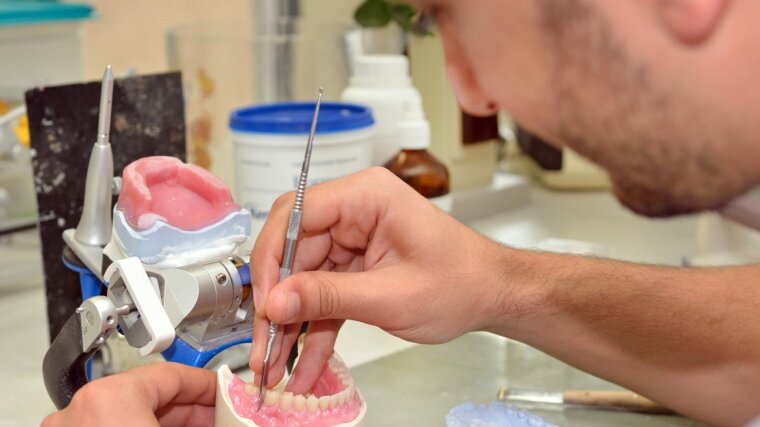
Content and structure
Dentistry deals with the detection and treatment of diseases of the teeth, mouth and jaw. The study programme Dentistry leads to the state examination. It is supplemented by subsequent further training, which will accompany you throughout the entire period of your professional practice. Both the training and the practice of dentistry are regulated by the Approbationsordnung für Zahnärzte (Licensing Regulations for Dentists). The training to become a dentist is based on scientific principles and is both practice- and patient-oriented. The study programme is divided into three study sections of one, one and a half, and two and a half year’s duration. The first pre-clinical study section contains the scientific basics (biology, chemistry, physics) and the introduction to anatomy, histology and materials science. The second pre-clinical study period includes training in physiology, biochemistry, anatomy, dental prosthetics and materials science. The subsequent clinical study period comprises training in the individual clinical areas of dentistry. It concludes with the dental examination. After successful completion of the studies, the licence to practise dentistry, i.e. the state licence to practise dentistry, is granted upon application. It is valid throughout Germany.
Changes in the award procedure
Please note that the allocation procedures in the study programmes with nationwide admission restrictions for Friedrich Schiller University Jena have changed significantly since the winter semester 2020/21. You can find information on the allocation procedure here.pdf, 370 kb · de
Special characteristics in Jena
The Jena Dentistry study programme is characterized by the specialist areas of CAD-CAM technologies, implantology, aesthetic dentistry, gerostomatology, material incompatibilities/corrosion research, functional diagnostics and composite technologies/surface finishing. For first-year students, there is a wide range of support and materials, such as detailed test and instruction booklets through the dental student council.
Prospects
Dentists find fields of activity in practice facilities, in hospitals, with authorities and in other areas, such as research.
Personal requirements
You should have diligence, perseverance, the ability to concentrate and a high capacity for absorption. A good memory facilitates learning facts. Content-related prerequisites include a broad general education as well as in-depth knowledge of the natural sciences. It should be noted that the later dental work with patients will lead to a high level of physical strain, as you will mostly be working in a standing position. Therefore, you should not have any impairments of the postural and supporting apparatus. You should also have good eyesight (spatial vision and full colour vision) and a certain manual dexterity (fine motor skills).
Admission requirements
-
University entrance qualification
A university entrance qualification, such as a general secondary school leaving certificate, is required for admission onto the study programme.
More information on university entrance qualifications can be found here.
-
language requirements
At the moment of application, you have to prove your knowledge of the German language at level DSH-2 (German Language Test for Admission to Higher Educationpdf, 61 kb · de). You cannot start your studies at the Friedrich Schiller University Jena if you have only passed the DSH-1 exam! The following certificates accredited by the German Rectors Conference will be recognized as equivalents:
- Goethe Certificate C2 (GDS)
- German Language Diploma Level II of the KMK (DSD II)
- TestDaF, at least TDN 4 in all four parts of the examination
- telc Certificate C1 German for Higher Education
- German exam as part of the assessment test at a Studienkolleg
If you do not have sufficient knowledge of German yet, the Friedrich Schiller University Jena offers you a preparatory language course for the DSH exam. To attend the course, your German knowledge must be at least on level B1.
Contacts
An der alten Post 4
07743 Jena
Google Maps site planExternal link
Bachstraße 18
07743 Jena
Google Maps site planExternal link
Bachstraße 18
07743 Jena
Google Maps site planExternal link
Bachstraße 18
07743 Jena
Google Maps site planExternal link
Jorge-Semprun-Platz 4
99423 Weimar
Google Maps site planExternal link
University Main Building / SSZ
Fürstengraben 1
07743 Jena
Google Maps site planExternal link
Office hours:
The Central Student Advisory Service will be closed from 22 December 2025 to 2 January 2026. We will be happy to assist you again from 5 January 2026!
We offer consultations in person, by telephone, and via Zoom. You can make an appointment by calling us on +49 3641 9-411111 (Mondays to Fridays from 9:00 to 11:00) or outside these office hours on +49 3641 9-411200. You can also use our remote help desk.
Consultation hours:
Mondays, Tuesdays, Thursdays and Fridays (9:00 to 12:20), Tuesdays (14:00 to 18:00), and Wednesdays and Thursdays (14:00 to 16:00).
Video chat: To the video chat – Zoom Videochat ZeitenMondays to Fridays (12:30 to 13:00) Password ZSB2020 Data protection informationpdf, 101 kb
University Main Building, Room E065
Fürstengraben 1
07743 Jena
Google Maps site planExternal link
Opening hours:
Information Desk (UHG; Room E0.65)
Mondays (10:00 – 12:00)
Tuesdays (13:00 – 15:00)
Wednesdays (10:00 – 12:00)
Thursdays (13:00 – 15:00)
Fridays (10:00 – 12:00)
You can also use our remote help desk at
www.uni-jena.de/service-ssz
or send us your enquiries by post.
Telephone hours:
Mondays to Fridays
(9:00 – 11:00)
Postal address:
Friedrich-Schiller-Universität Jena
Studierenden-Service-Zentrum
07737 Jena
University Main Building
Fürstengraben 1
07743 Jena
Google Maps site planExternal link